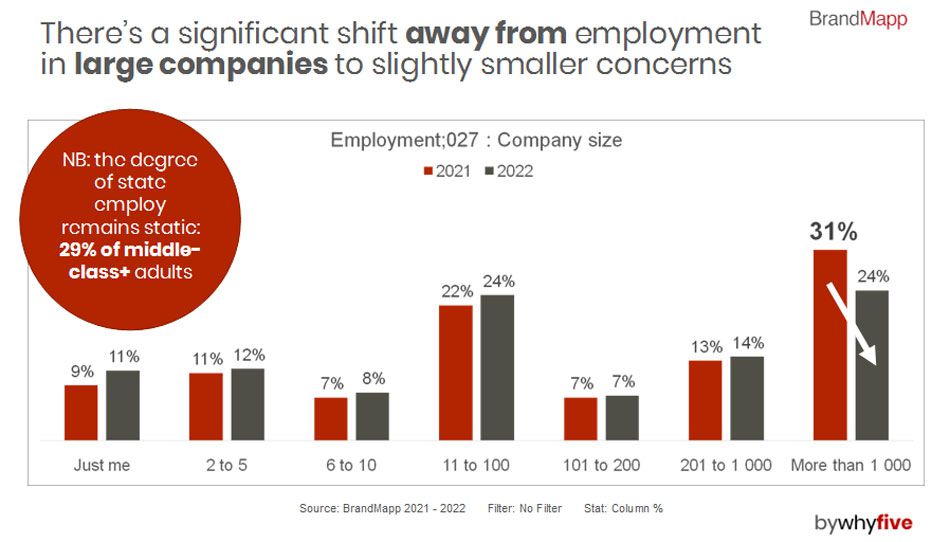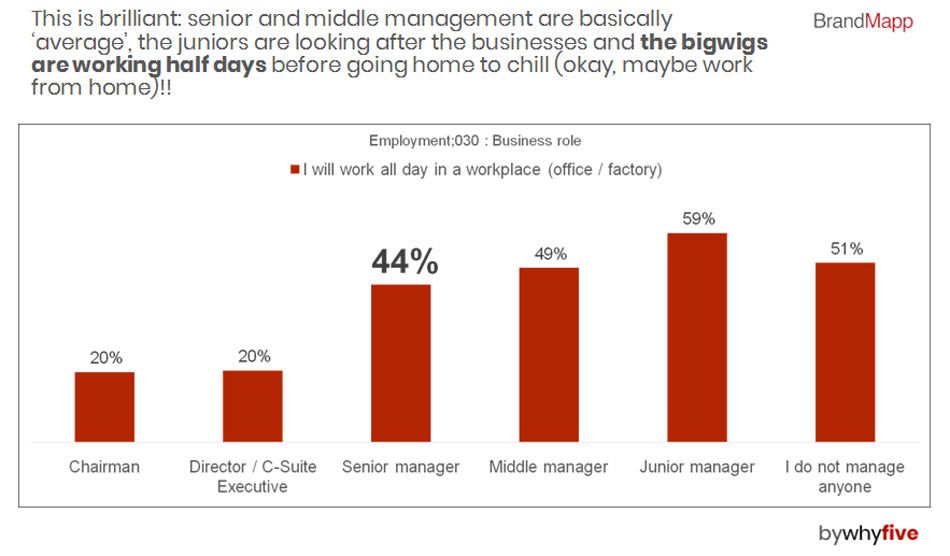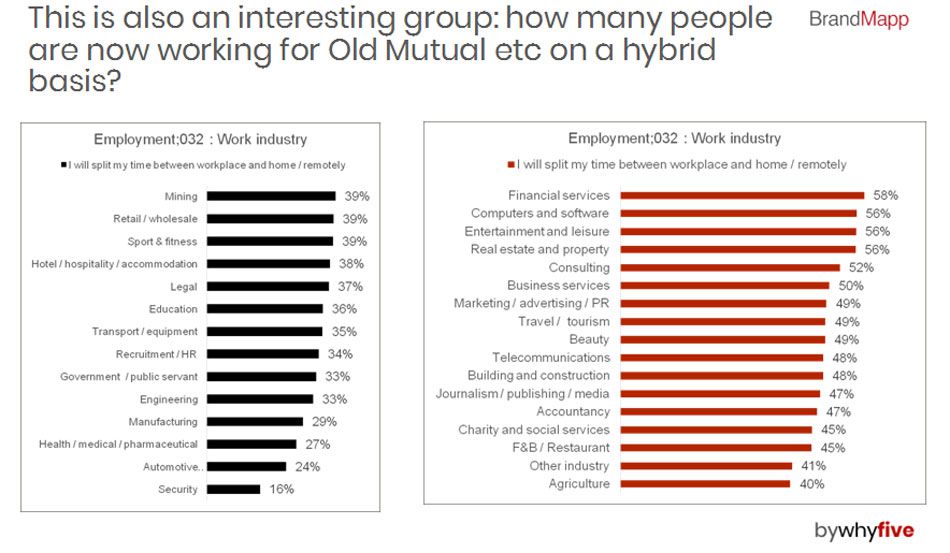Before the pandemic disruption, the sun was already setting on the era of office drones and cubicle dwellers. The sudden mass exodus of workers from the workplace two years ago has only accelerated the development and uptake of technologies that make a vast number of employees capable of remote work - and proved more quickly, and on a global scale, that people working from their homes are still productive workers.
While there is much to be said in favour of the five-day-a-week return to the workplace and all the benefits of in-person co-mingling with teammates and colleagues, many remote-capable employees have had longstanding yearnings and aspirations for more flexible working conditions – or at very least what has become know a ‘hybrid working’ model. And it’s a trend that is measured for the first time in this year’s annual BrandMapp survey. Based on a sample of more than 33,000 respondents, representing the 12.8 million South African adults living in households with monthly income exceeding R10K, BrandMapp 2022 shows the country’s workplaces in a state of flux that mirrors global working trends.
Working, or not?
Perhaps as expected, the survey reveals a slight drop in full-time employment as compared to 2021. There has also been a subtle shift towards self-employment and part-time work, with a minimal rise in unemployment. Given the current economic hardships, these changes are slight enough to still argue for the resilience and robustness of the country’s tax-paying middle-class. As director of storytelling for BrandMapp, Brandon de Kock explains, “It’s a picture that’s totally in line with the latest Quarterly Labour Force survey showing that while unemployment is rising as a percentage of total population, we are still adding hundreds of thousands of jobs back into the economy. As always, we are a country of extremes and you can’t just look at one side of the equation to understand what’s really going on!”

“The more interesting change in 2022 is about where and how the middle-class is employed,” De Kock continues. “What’s important to note is that government employment is static with the same 29% of mid- and top-income earners in state jobs this year. However, there’s a significant shift away from employment in large companies with over 1,000 employees to smaller concerns. Is this because the corporate behemoths are less inclined to enable the more flexible working conditions that employees are wanting?”
Working from home or office?
In line with global working trends showing an average of 39% of the world’s workforce practicing hybrid work, BrandMapp confirms that we are seeing a limited return to the five-day office week. Almost half of the middle-class earning under R40K a month has returned to the pre-pandemic work routine, while 36% of them have become hybrid workers. For the top earners, it’s almost exactly the other way around with only 37% of them in their workplaces all week, and 46% splitting their times. “Some of them are no doubt enjoying the peace and quiet, and better coffee, that comes with working from home for at least part of the working week,” says De Kock. “This matches other data coming out of countries with developed economies that is showing that more executive-level workers are benefitting from hybrid work models while the workers have been summoned back to their desks.”
With employee demand for flexible working conditions front and centre, and hybrid work options touted as one of the important ways that employers can compete for top talent, it’s helpful to know what kinds of companies are enabling this. BrandMapp’s granular data-set allows for a closer look.
The data suggests that the largest South African companies are currently better enablers of hybrid and remote work than their medium-to-large counterparts. You are more likely to have to return permanently to your workplace if you are working for a company with more than 10 but less than 1,000 employees. For the time being, it seems that the corporate behemoths are not inflexible employers. Rather they seem to have their fingers on the pulse of the future of work and are better at allowing remote-capable employees to do their thing.

“When we look at the return to the corporate five-day-week in the office for South African managers,” explains De Kock, “senior and middle management reflect the global average – which is a 44% full-time return to the workplace. However, our junior managers are clearly holding down the fort! This comes at a time when there’s a growing corporate call for all workers to make a permanent return to the office – perhaps indicating that there's a case of ‘do what I say, not what I do’ at play at the top management level.”
What is striking is how many careers were traditionally office-bound roles before Covid. As they do, the crisis delivered opportunities for discovery and learning. Many more workers have lived proof that they are remote-capable, and amongst them are those who now also know that remote work suits them better than being in the office.
Technology has clearly been a great enabler. Since BrandMapp includes a comprehensive view of digital habits, we can also see how usage of virtual conferencing and meeting platforms has continued to grow. “The Zoom-boom wasn’t a stopgap, it was a meaningful trend,” says De Kock. “We’re measuring 42% of the total middle-class-and-up workforce saying that they regularly use platforms like Zoom, Teams and Google Meets. And there’s no reason to think it’s a behaviour that’s going to change any time soon.”

De Kock continues, “It’s notable that 58% of middle-class South Africans embracing hybrid work are employed in the country’s financial services industry, arguably the ultimate, traditional cubicle-dweller workplaces. Who says, ‘You can’t teach an old dog a new trick’? On the lower end of this scale, it’s also significant that one third of middle-class-and-up South African government employees are looking at hybrid work options.” This data points to an argument that the establishments we are inclined to consider the most inflexible and resistant to change, are actually riding the waves of Covid impacts and making strides when it comes to adapting and adopting new modes of work.
BrandMapp 2022 is now available, visit www.brandmapp.co.za.
